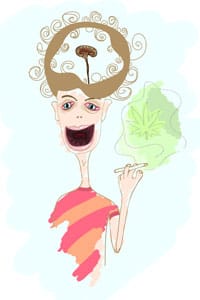Marijuana is perhaps the most widely used illegal drug in the world. It has been used for a wide variety of purposes for thousands of years and in many different cultures. The plant itself is used for everything from clothing to paper. Today, marijuana as a drug form is primarily used recreationally. However, it is also being utilized for a growing number of medicinal purposes. Most people who use marijuana recreationally smoke it, although some put it into food and eat it, or combine it with other substances. On its own, marijuana has many distinctive affects on the mind and body that are typically temporary in nature. These affects can be more profound and long lasting for those who use marijuana daily or for a prolonged length of time. As for the immediate effects of marijuana on the brain, science has been able to determine the processes that occur.
THC and brain receptors
The chemical THC (delta-9-tetrahydrocannabind) is the effective ingredient in marijuana. When marijuana is smoked, the THC quickly leaves the lungs and enters the blood stream. Once in the bloodstream it makes its way to the brain. THC works by interfering with cannabinoid receptors in the brain. The largest number of these receptors are located in areas of the brain that control pleasure, memory, concentration, sensory experiences, time perception, learning and coordination. The feelings associated with being “high” are induced shortly after THC is introduced into the body, as the brain’s neurotransmitters are altered by the chemical.
Marijuana intoxication
The initial stages of a typical marijuana high involve a quick feeling of relaxation. The user will notice a light-headed feeling along with what is often described as a hazy feeling. The user’s eyes will dilate dramatically. This dilation of the eyes is what may contribute to the belief that, while under the influence of marijuana, users are seeing colors more dramatically and distinctly than before. Since the area of the brain that helps determine time perception is impaired, those under the influence of marijuana believe time is moving slowly. They often can’t accurately determine the time of day or how long they may have been somewhere. They will often believe they’ve been somewhere or have done something for much longer than they actually were. Concentration and the ability to learn are subsequently blocked while they are intoxicated by the drug. This makes it virtually impossible for someone under the influence of marijuana to focus on a given task or learn a new task. Also, the drug significantly impairs problem solving skills. The effects of smoking marijuana take place within minutes, and typically last anywhere from one to three hours. However, if marijuana is eaten in a food or consumed in a drink, the effects take significantly longer to be felt fully. It can be a half hour and up to a full hour before the user feels any kind of high. When marijuana is eaten, however, the effects can last up to four hours.
The effects of long term use
While the effects of using marijuana are short term and last the duration of a few hours, prolonged and daily use can cause more permanent changes to the mind and body. Since THC stimulates the brain to release dopamine, using marijuana regularly over time can interfere with the brain’s ability to release dopamine correctly on its own. There can also be permanent damage to the memory centers of the brain. Heavy marijuana use has been shown to permanently interfere with the ability to form short term memories. It can also cause a permanent decrease in a person’s reaction time. Additionally, long term use has been linked to an increase in feelings of fear, paranoia, and anxiety. Problem solving skills, coordination, and the ability to learn can all be negatively affected with heavy or long term use of marijuana.
Marijuana addiction
While no one can say for sure the exact amount or the specific length of time someone must use marijuana in order to suffer any long term or irreversible effects, marijuana is addictive and most users require more and more to achieve that initial high. While many believe that marijuana is only psychologically addictive, there is some controversy as to whether it is physiologically addictive as well. People who use it regularly often do experience both physical and emotional withdrawal symptoms. These may include feelings of depression, decrease in appetite, aggressive tendencies, and anxiety. As with other drugs, there is no medication that can cure some of his or her compulsion to use marijuana. However, a combination of behavioral treatment and addiction support groups can help those addicted to marijuana break free from their ongoing need to get high and lead a drug free life.

